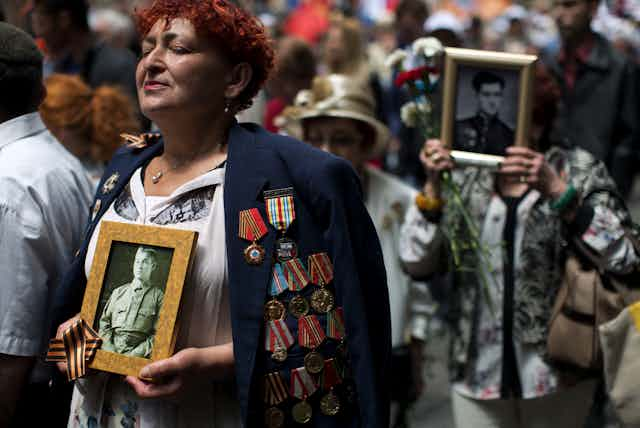How happy the Austrians will be that the Bleiburg commemorations won’t be happening in 2020. Each year, groups of Croatians normally gather at Bleiburg in Carinthia to remember the tens of thousands of Nazi-supporting Ustaša fighters murdered in Austria by Yugoslavian partisans at the end of the war in Austria. The Carinthian authorities, embarrassed by this show of far-right nationalism, have so far been unable to stop the commemorations. Until the advent of the coronavirus.
The German chancellor Angela Merkel, meanwhile, who skipped the May 9 Moscow victory parade in 2015 in symbolic protest at the Russian annexation of Crimea, must surely be relieved that she hasn’t had to formally decline Russian President Vladimir Putin’s invitation to the May 9 military parade in Moscow in 2020 – because that won’t be happening either. It all eases the diplomatic stress.
One might hope, then, that the scaling down or cancelling of end-of-war commemorations might have a salutary effect by giving pause for thought. Unfortunately, there is little room for optimism.
For years now, historical arguments have been raging throughout Europe, with the fault lines often running between Russia and other eastern European countries such as Poland and the Baltic states, or the Czech Republic. They centre on whether or not the Soviet Union should be seen in these countries as a liberator from Nazism, or as the oppressive bringer of communism.

The Red Army was of course both – but while Putin’s view of history focuses on liberation, the view in Poland and elsewhere in eastern Europe focuses on oppression.
The Hitler-Stalin Pact has also become a bone of contention: Poland argues that Stalin was as much to blame as Hitler for starting the second world war, while Putin blames the west’s appeasement of Hitler, and, in December 2019, accused Poland’s envoy to Nazi Germany in 1939, Józef Lipski, of being an “antisemitic pig”.
The European Union didn’t help matters when it passed a resolution in 2019 effectively supporting the Polish position on the Hitler-Stalin Pact. Putin’s history war with eastern Europe is now firmly one with western Europe, too.
Liberation and oppression
When the Cold War ended in 1989, the EU attempted to create a European memory around the Holocaust, but encountered resistance from some eastern European member states reluctant to confront the memory of the extent to which they had collaborated. Now the EU has swung round to centering its memory on totalitarianism: Hitler and Stalin. Most European countries can agree on that. But not Putin.
These disputes have been playing out for years – and memorials and commemorative events have been a key battleground. There are few signs that the current commemorative lull imposed by lockdown is going to change this.
The diplomatic spat between Russia and the Czech Republic over the removal of a statue of Ivan Konev is still rumbling on. Konev led the Red Army troops that liberated Prague in 1945, but he is remembered by many Czechs for his brutal role in suppressing the Prague Spring.

Prague took down the statue in early April, whereupon – according to the most extraordinary rumour – a Russian intelligence operative was apparently flown to Prague to poison the city’s mayor. While he was reportedly put under police protection along with two other Prague politicians critical of Russia, at the time of writing the Russians and Czechs are bickering over what to do with the statue.
When Berlin’s mayor Michael Müller invited representatives of Russia and Ukraine to a small-scale commemoration of the liberation of Berlin on May 2, Ukraine’s ambassador in Berlin, Andrij Melnyk, described the idea as his “worst nightmare”. The event went ahead without him.
Shifting sentiment
International commemoration reflects and possibly intensifies present-day tensions rather than defusing them. As long as eastern Europe feels threatened by Russia, there will be no agreement on what “liberation” in 1945 meant.

There are signs, too, that shifting end-of-war commemoration to a later date, such as September 2020, because of the pandemic will merely cause new problems. Putin recently decided to commemorate the end of the war against Japan on September 3 (the day China commemorates it) rather than on September 2 (when the US marks the occasion). He may decide to turn any belated May 9 event into a demonstration of improving Sino-Russian relations in face of Trump’s anti-Chinese stance.
The pandemic has led some countries to remember the end of the war within a purely national framework, but this is leading to self-indulgence. German newspapers are currently full of articles about German suffering at the end of the war – far more so than was the case in 2015, during the 70th anniversary.
In Britain, for purposes of commemoration, homes are being re-imagined as private-public interfaces, with citizens being encouraged to engage in doorstep singalongs and make their own flags. Evoking the community spirit during lockdown is commendable. I feel less happy about the British Legion’s “Tommy in the Window” campaign: I doubt Commonwealth soldiers will feel embraced by the term “Tommy” (which refers to the fictitious archetypal English soldier, “Tommy Atkins”) – or even the Scots, Irish and Welsh.
Whether on the international or national stage, jingoism is often the bane of commemoration.

